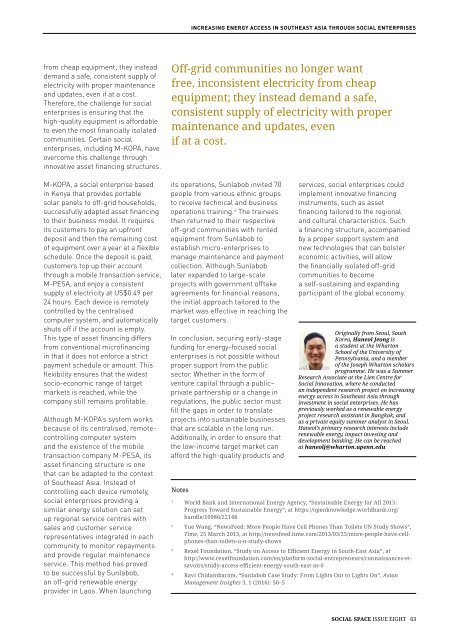Social Space (Issue 8, 2016-2017) - The Social Finance Issue
Since its debut in 2008, Social Space, the bi-annual flagship publication of the Lien Centre for Social Innovation at Singapore Management University, has provided a platform for local and international practitioners and thought leaders to share their perspectives on social innovation and entrepreneurship. Available in print and online (http://www.socialspacemag.org).
Since its debut in 2008, Social Space, the bi-annual flagship publication of the Lien Centre for Social Innovation at Singapore Management University, has provided a platform for local and international practitioners and thought leaders to share their perspectives on social innovation and entrepreneurship. Available in print and online (http://www.socialspacemag.org).
You also want an ePaper? Increase the reach of your titles
YUMPU automatically turns print PDFs into web optimized ePapers that Google loves.
Increasing Energy Access in Southeast Asia through <strong>Social</strong> Enterprises<br />
from cheap equipment; they instead<br />
demand a safe, consistent supply of<br />
electricity with proper maintenance<br />
and updates, even if at a cost.<br />
<strong>The</strong>refore, the challenge for social<br />
enterprises is ensuring that the<br />
high-quality equipment is affordable<br />
to even the most financially isolated<br />
communities. Certain social<br />
enterprises, including M-KOPA, have<br />
overcome this challenge through<br />
innovative asset financing structures.<br />
M-KOPA, a social enterprise based<br />
in Kenya that provides portable<br />
solar panels to off-grid households,<br />
successfully adapted asset financing<br />
to their business model. It requires<br />
its customers to pay an upfront<br />
deposit and then the remaining cost<br />
of equipment over a year at a flexible<br />
schedule. Once the deposit is paid,<br />
customers top up their account<br />
through a mobile transaction service,<br />
M-PESA, and enjoy a consistent<br />
supply of electricity at US$0.49 per<br />
24 hours. Each device is remotely<br />
controlled by the centralised<br />
computer system, and automatically<br />
shuts off if the account is empty.<br />
This type of asset financing differs<br />
from conventional microfinancing<br />
in that it does not enforce a strict<br />
payment schedule or amount. This<br />
flexibility ensures that the widest<br />
socio-economic range of target<br />
markets is reached, while the<br />
company still remains profitable.<br />
Although M-KOPA’s system works<br />
because of its centralised, remotecontrolling<br />
computer system<br />
and the existence of the mobile<br />
transaction company M-PESA, its<br />
asset financing structure is one<br />
that can be adapted to the context<br />
of Southeast Asia. Instead of<br />
controlling each device remotely,<br />
social enterprises providing a<br />
similar energy solution can set<br />
up regional service centres with<br />
sales and customer service<br />
representatives integrated in each<br />
community to monitor repayments<br />
and provide regular maintenance<br />
service. This method has proved<br />
to be successful by Sunlabob,<br />
an off-grid renewable energy<br />
provider in Laos. When launching<br />
Off-grid communities no longer want<br />
free, inconsistent electricity from cheap<br />
equipment; they instead demand a safe,<br />
consistent supply of electricity with proper<br />
maintenance and updates, even<br />
if at a cost.<br />
its operations, Sunlabob invited 70<br />
people from various ethnic groups<br />
to receive technical and business<br />
operations training. 4 <strong>The</strong> trainees<br />
then returned to their respective<br />
off-grid communities with rented<br />
equipment from Sunlabob to<br />
establish micro-enterprises to<br />
manage maintenance and payment<br />
collection. Although Sunlabob<br />
later expanded to large-scale<br />
projects with government offtake<br />
agreements for financial reasons,<br />
the initial approach tailored to the<br />
market was effective in reaching the<br />
target customers.<br />
In conclusion, securing early-stage<br />
funding for energy-focused social<br />
enterprises is not possible without<br />
proper support from the public<br />
sector. Whether in the form of<br />
venture capital through a public–<br />
private partnership or a change in<br />
regulations, the public sector must<br />
fill the gaps in order to translate<br />
projects into sustainable businesses<br />
that are scalable in the long run.<br />
Additionally, in order to ensure that<br />
the low-income target market can<br />
afford the high-quality products and<br />
Notes<br />
services, social enterprises could<br />
implement innovative financing<br />
instruments, such as asset<br />
financing tailored to the regional<br />
and cultural characteristics. Such<br />
a financing structure, accompanied<br />
by a proper support system and<br />
new technologies that can bolster<br />
economic activities, will allow<br />
the financially isolated off-grid<br />
communities to become<br />
a self-sustaining and expanding<br />
participant of the global economy.<br />
Originally from Seoul, South<br />
Korea, Haneol Jeong is<br />
a student at the Wharton<br />
School of the University of<br />
Pennsylvania, and a member<br />
of the Joseph Wharton scholars<br />
programme. He was a Summer<br />
Research Associate at the Lien Centre for<br />
<strong>Social</strong> Innovation, where he conducted<br />
an independent research project on increasing<br />
energy access in Southeast Asia through<br />
investment in social enterprises. He has<br />
previously worked as a renewable energy<br />
project research assistant in Bangkok, and<br />
as a private equity summer analyst in Seoul.<br />
Haneol’s primary research interests include<br />
renewable energy, impact investing and<br />
development banking. He can be reached<br />
at haneolj@wharton.upenn.edu<br />
1<br />
World Bank and International Energy Agency, “Sustainable Energy for All 2015:<br />
Progress Toward Sustainable Energy”, at https://openknowledge.worldbank.org/<br />
handle/10986/22148<br />
2<br />
Yue Wang, “NewsFeed: More People Have Cell Phones Than Toilets UN Study Shows”,<br />
Time, 25 March 2013, at http://newsfeed.time.com/2013/03/25/more-people-have-cellphones-than-toilets-u-n-study-shows<br />
3<br />
Rexel Foundation, “Study on Access to Efficient Energy in South-East Asia”, at<br />
http://www.rexelfoundation.com/en/platform-social-entrepreneurs/connaissances-etsavoirs/study-access-efficient-energy-south-east-as-0<br />
4<br />
Ravi Chidambaram, “Sunlabob Case Study: From Lights Out to Lights On”, Asian<br />
Management Insights 3, 1 (<strong>2016</strong>): 50–5<br />
<strong>Social</strong> <strong>Space</strong> ISSUE EIGHT 63


